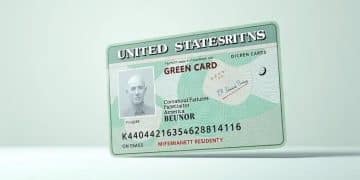Gold USA residency basics & Trump’s visa card citizenship

Navigating the application process for U.S. residency or citizenship involves gathering required documents, applying online, understanding processing times, and responding promptly to any requests from USCIS.
Gold USA residency basics are essential for anyone looking to navigate U.S. immigration. With the complexities involved, do you know how to make the most of your options? Let’s dive in!
Understanding Gold USA residency benefits
Understanding Gold USA residency benefits is crucial for anyone considering long-term living options in the United States. These benefits provide a pathway to a more comfortable and secure life. Knowing how these benefits work can open doors to incredible opportunities.
Key Benefits of Gold USA Residency
When you attain Gold USA residency, you gain access to numerous advantages that enhance your experience in the country. Some of these include:
- The ability to live and work anywhere in the U.S.
- Access to U.S. healthcare and social services
- Pathway to citizenship after a few years
- In-state tuition rates at public colleges and universities
These benefits are designed to support residents as they integrate into American society.
Working Opportunities
One of the most appealing aspects of Gold USA residency is the freedom to pursue job opportunities in any industry. You can apply for positions without needing to rely on a visa, simplifying the employment process significantly. This also means you can invest in your career without the fear of visa restrictions.
Moreover, U.S. employers often prefer hiring residents, as they do not face the same procedural hurdles as foreign workers. This often leads to better job security and career advancement.
Healthcare Access
Another major benefit is access to healthcare services. With Gold USA residency, you can enroll in programs like Medicare, which provides affordable medical care. Having health coverage gives you peace of mind if you encounter medical issues.
Additionally, many employers offer health insurance packages for residents, ensuring comprehensive care. This is essential not only for your health but also for your financial stability.
Education Opportunities
If you have children or are looking to further your own education, residency offers the chance to benefit from in-state tuition rates. This significantly lowers the cost of education at state universities and colleges. Furthermore, there are numerous scholarship and grant opportunities available for residents, making higher education more accessible.
Having a strong educational background can also enhance your job prospects, helping you establish a successful career in the U.S.
How Trump’s visa card works

How Trump’s visa card works is essential for understanding the immigration process in the U.S. This card can simplify your journey towards residency and provide many benefits.
Understanding the Visa Card
The Trump visa card functions as a pathway for individuals looking to live, work, or study in the United States. It offers legal status and allows cardholders to access various services and opportunities.
- Provides a straightforward application process.
- Allows holders to travel freely within the U.S.
- Enables employment without additional permits.
- Facilitates access to government services.
These features make the visa card a valuable asset for many looking to establish themselves in the U.S.
Eligibility Requirements
To qualify for the Trump visa card, applicants must meet specific requirements. This includes having a clean criminal record, proof of employment or financial stability, and possibly sponsorship from a U.S. citizen or employer.
Meeting these criteria ensures that you can take full advantage of the benefits the visa card offers. Additionally, documents such as passports, birth certificates, and proof of residency may be needed to complete the application.
Application Process
The application process for the Trump visa card is designed to be efficient. It starts with submitting the required documents and filling out the necessary forms. It’s essential to provide accurate information to avoid delays.
After submitting your application, you may be called for an interview to discuss your eligibility further. This is a crucial step, as it gives immigration officials a chance to verify your information.
Benefits of the Card
Holding a Trump visa card highlights your lawful status in the U.S., offering peace of mind. You can enjoy various benefits such as:
- Access to better job opportunities.
- Eligibility for certain government programs.
- Ability to travel outside the U.S. and return without issues.
This security allows cardholders to focus on building their lives and careers in the United States without constant anxiety about their legal status.
Requirements for obtaining citizenship
Requirements for obtaining citizenship in the United States are essential for anyone looking to fully engage in American life. Understanding these requirements can help simplify your path to citizenship.
Basic Eligibility Criteria
To apply for U.S. citizenship, you must first meet some basic eligibility criteria. This includes being at least 18 years old, being a lawful permanent resident for at least five years, and demonstrating good moral character.
- Must have been a permanent resident for at least five years.
- Demonstrate an understanding of U.S. history and government.
- Ability to read, write, and speak basic English.
- Show adherence to the principles of the U.S. Constitution.
These criteria ensure that applicants are prepared to contribute positively to society.
Application Process
The application process requires filling out Form N-400, the Application for Naturalization. This form collects important information about your background and residency. After submitting your application, you will receive a receipt notice indicating your application is being processed.
Following that, you’ll have an interview where you will be tested on your English and civics knowledge. Being prepared for this interview is crucial as it impacts your chances of successfully attaining citizenship.
Supporting Documents
When applying for citizenship, you must submit supporting documents. This includes a copy of your Green Card, documents supporting your residence, and evidence of your good moral character.
It’s also important to keep records of any travel outside the U.S., as extended absences can affect your residency requirements. Gather these documents early to ensure a smoother process.
Final Steps
If your application is approved, you will be scheduled for a naturalization ceremony. Here, you will take an oath of allegiance, completing your journey toward citizenship.
This final step is significant, as it symbolizes your commitment to the United States and its values. Becoming a citizen opens doors to new opportunities and responsibilities.
Navigating the application process efficiently

Navigating the application process efficiently is crucial for anyone seeking to obtain U.S. residency or citizenship. Understanding each step makes it easier to avoid common pitfalls and ensures a smooth journey.
Preparing Your Documents
Before you begin the application process, it’s essential to gather all necessary documents. This includes proof of residency, identification, and financial records. Having everything organized will save you time and reduce stress as you move forward.
- Valid passport and identification.
- Proof of lawful permanent residency.
- Financial documents for stability verification.
- Any prior immigration documents.
Staying organized by creating a checklist can help you keep track of these important materials.
Online Applications
Many applications can be submitted online, which is faster and more efficient. When applying online, ensure you complete each section carefully. Double-check your information to avoid mistakes that could slow down the processing time.
Utilizing online resources will also help you stay updated on any changes to application rules or procedures. This includes reviewing the official U.S. Citizenship and Immigration Services (USCIS) website for updates.
Timelines and Processing
Understanding the timelines associated with your application is key. Processing times can vary widely, so being patient is crucial. Check USCIS estimated wait times for your specific application type to plan accordingly.
It is also wise to submit your application well in advance of any deadlines. This way, any unexpected delays will not hinder your goals.
Follow-Up Steps
After you submit your application, you may receive a receipt notice. This is an important document as it contains your case number and other vital details. Keep track of your case status online to stay informed about its progress.
If further information is requested, responding promptly will help keep your application moving forward. Being proactive is an effective strategy to navigate the application process successfully.
In summary, navigating the application process for U.S. residency or citizenship requires careful planning and organization. By understanding the requirements, preparing your documents, and staying informed about the process, you can enhance your chances of success. Remember to be patient during the waiting periods and responsive to any requests for information. With these strategies, you can approach your journey toward residency or citizenship with confidence and clarity. There are many resources available to help you along the way, ensuring that you are never alone in your journey.
FAQ – Frequently Asked Questions about Navigating the U.S. Application Process
What documents do I need to gather before applying for residency or citizenship?
You need documents such as a valid passport, proof of residency, financial records, and any previous immigration forms.
Can I apply for citizenship online?
Yes, many applications, including the citizenship application, can be submitted online for convenience.
How long does the application process typically take?
The processing time can vary widely, but it’s important to check the estimated wait times provided by USCIS.
What should I do if USCIS requests additional information?
Respond promptly with the requested information to avoid delays in your application process.





